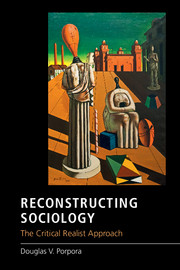Book contents
- Frontmatter
- Dedication
- Contents
- Acknowledgments
- 1 Seven myths of American sociology
- 2 Do realists run regressions?
- 3 What is truth?
- 4 Whatever happened to social structure?
- 5 Are we not men – or, rather, persons?
- 6 What and where is culture?
- 7 Do we need critical realism?
- 8 So what do we do with it?
- Bibliography
- Index
5 - Are we not men – or, rather, persons?
Published online by Cambridge University Press: 05 April 2016
- Frontmatter
- Dedication
- Contents
- Acknowledgments
- 1 Seven myths of American sociology
- 2 Do realists run regressions?
- 3 What is truth?
- 4 Whatever happened to social structure?
- 5 Are we not men – or, rather, persons?
- 6 What and where is culture?
- 7 Do we need critical realism?
- 8 So what do we do with it?
- Bibliography
- Index
Summary
For those too young to remember, the title of this chapter is an homage to the punk band, Devo, whose name signified its charge that, at least in America, humans were no longer evolving; instead we were devolving or going backward. From what were we devolving? If we exchange the sexist designation men, we arrive at persons and at personhood as an ontological category.
Whether American society is devolving is a theoretical question that needs to be answered empirically. Whether American sociology is devolving is a question that is metatheoretical in nature. Within sociological theory, if the category of person is not quite devolving, it is at least under sustained attack from multiple directions.
What is a person? The question is the title of a CR book by Christian Smith. He needs to ask because in sociology, we rarely speak of persons or of personhood. We speak rather of the self, as do the Symbolic Interactionists or as in poststructuralist circles of the subject or Cartesian subject. Person, though, is the technical term used in philosophy and law and is the term critical realists tend to favor.
Although person more or less coincides with what we in sociology call the self, it bears different connotations. Whereas the self conveys an image of something floating inside us, some mysterious I and me that we need to locate, person is not something we have but something we are. Put in sociological terms, persons do not have selves; they are selves. The full meaning of that declaration is something in this chapter we will explore further.
In Chapter 4 I spoke in passing of zombies. As I write, zombies are hot; in film and on television, they have replaced vampires as the favored denizen of the supernatural. Wikipedia provides a very apt definition of zombie: “a hypnotized person bereft of consciousness and self-awareness, yet ambulant and able to respond to surrounding stimuli.”
Re-read Wikipedia's definition of zombie and behold: It also describes in nuce what has become of persons in much contemporary sociological theory. Contemporary sociological theory is uncomfortable with persons, selves, or Cartesian subjects. Contemporary sociological theory does not want consciousness or at least centered, reflective, self-aware consciousness. It expressly does not want intentionality. In their place, contemporary sociological theory wants – at most – the unconscious, hypnotized responsiveness to surrounding stimuli of Bourdieu's habitus.
- Type
- Chapter
- Information
- Reconstructing SociologyThe Critical Realist Approach, pp. 129 - 158Publisher: Cambridge University PressPrint publication year: 2015



